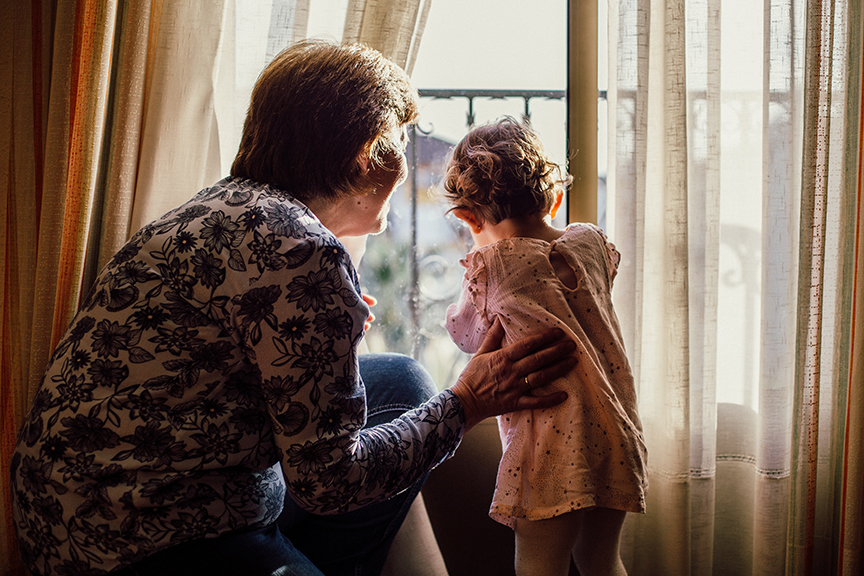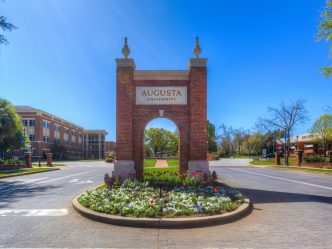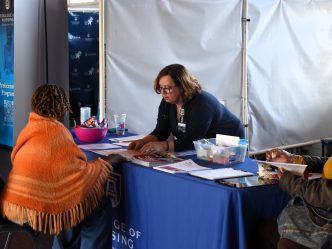For more than 20 years, an Augusta University program has been helping families not only stay healthy, but also stay together.
The Healthy Grandparents Program was established in 1999 by Augusta University’s College of Nursing to provide physical, emotional and social support to grandparents and great-grandparents raising their grandchildren.
Professor Emeritus Barbara Woodring, EdD, RN, wrote the original grant to receive funding, which was approved in October 1998. The funding helped begin a program to address a local health care issue: at the time, many underserved children missed primary health care and follow-up appointments. Often these children were in the foster care system.
Woodring thought if the children were living in intergenerational family settings, primarily with grandparent-headed households, the children would have more security and better outcomes.
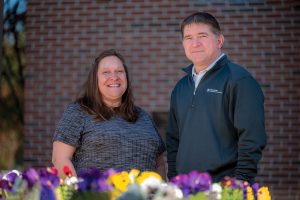
To date, the program has served 534 families, 743 grandparents and 1,140 grandchildren, and with the help of three local attorneys, has assisted grandparents with obtaining full legal custody or adopting over 350 of their grandchildren.
Creating the service
Woodring was a professor of pediatric nursing and chair of the Department of Maternal-Child Health at the Medical College of Georgia. She was responsible for teaching and coordinating academic and clinical activities related to nursing care of children and families at the undergraduate and graduate levels.
She was also vice president of the National Society of Pediatric Nurses and was responsible for planning and coordinating national conferences related to care of children and families. This gave her a widespread network from which to draw on when she began developing curricula and programs, including Healthy Grandparents.
“Initially, I was driven by the children … I saw far too many youngsters in unhappy and unhealthy care situations,” said Woodring, who is also the retired director of the Byrdine F. Lewis College of Nursing at Georgia State University. “Parents just disappearing or dying, parents influenced by long-term substance abuse often landing in jail and children left to flounder. There were never enough good foster parents to meet the needs.
“My research and experience told me that a child’s life would usually be better if raised within an intergenerational family setting who could love, mentor and support them within their own cultural and social context. I came to realize that this responsibility frequently fell to grandparents, many of them with their own health issues and/or limited social and financial resources. It then became apparent that to reach my goal of a more healthy, secure future for this group of children, we would also have to meet some needs of their caregiver — the grandparents.”
Woodring said one key difference between Augusta University’s program and the original one from Boston was the incorporation of undergraduate and graduate nursing students at all levels. In the beginning, students made home visits to assess the environment and physical health needs of the children and the grandparents and made referrals as needed. They were also involved in educational and social activities with groups of grandparents and different age groups of kids.
“It was an attempt to broaden the exposure of nursing students to see children in the context of a family whole, even if unlike that which was described in the textbook; to see child development outside a hospital setting. This was an excellent learning experience and the grandparents loved the attention,” Woodring said.
“Then, success struck. The program grew too large to be able to assign faculty supervision and provide consistent numbers of students. So, that portion of the program evolved in a different direction.”
Building a foundation
Mike Patton was recruited by Woodring and began working with the College of Nursing in January 1999 as the program coordinator for HGP. Associate Professor Mary Lou L. Davis, PhD, has been the program director and principal investigator since August 2015, when she came to Augusta University.
Both have worked countless hours building upon the program’s foundation while trying to improve and expand on it every chance they get.
“We provide the same services now as when we started, such as case management services, nursing and health care services, support groups and legal assistance for custody and adoption. But we have added other services over time based on the needs of our families, such as book bags and school supplies, funds to help pay for summer camp and respite care, after-school enrichment activities, and purchasing home computers to help kids do online instruction during COVID,” Davis said.
“Through a great deal of help and support from individuals and groups in the community, we have also drastically increased the number of families we help during the Christmas holidays with gifts and gift cards to purchase groceries.”
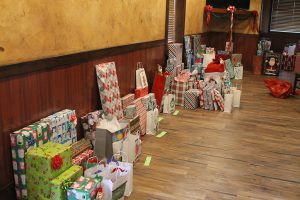
Patton’s involvement since the program’s inception has allowed him to personally connect with each family that has come through. He said when you meet any grandparent who is raising a grandchild, it does not take very long to get emotionally invested.
“We spend a lot of time in their home, especially early on, getting to know them and their journey of being a grandparent caregiver,” Patton said. “We listen and learn from the families about the struggles they go through, the sacrifices they make, and their commitment to the health and well-being of their grandchildren that is absolute. The grandparents are not making a commitment of a few weeks or even a few years to their grandchildren — it’s a lifetime commitment.”
Patton said the grandparents are “absolutely selfless” in becoming the sole providers for their grandchildren from the day they are born to the time they reach adulthood. He’s also witnessed how resilient the grandchildren are and their ability to overcome often difficult circumstances.
“One of the best parts of being in this position is we get to see many of these grandchildren grow up,” Patton said. “We have a number of families that have been coming to the monthly support group meetings for 10, 15-plus years. It’s an awesome experience to witness so many of the grandchildren graduate from high school, go to college, get a college degree, serve in the military and become highly successful.
“It’s a testament to the environment the grandchildren grow up in with their grandparents, but also how incredibly resilient children can be when they are given the opportunity. The structure, discipline, support and unconditional love the grandparents provide gives their grandchildren the opportunity to overcome some very difficult circumstances and achieve anything they set their mind to.”
Grandparents stepping in
Natasha and Steven Lewis are raising their soon-to-be 8-year-old granddaughter, Madison, who is in second grade. Madison’s mother, Lameisha, gave birth to her and moved back home for support. Her plan was to enlist in the Air Force, but first she had to prove her daughter had someone to take care of her.
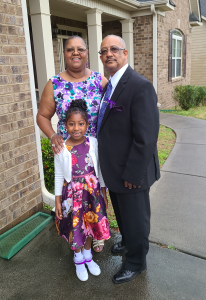
After Natasha and Steven went through the proper channels to get custody of Madison, Lameisha’s plans changed, and she eventually walked away from both her Air Force plans and Madison. She is paying child support but has limited visitation.
Natasha and Steven Lewis, who is a security guard at Fort Gordon after a 22-year military career, said they were receiving financial help from Temporary Assistance for Needy Families. Natasha said she first discovered the Healthy Grandparents Program when she saw a flyer on a church bulletin board.
“I got in touch with Mike [Patton] and talked with him about the program, and we got to sit with other grandparents who shed a lot of light on some things that they were going through … But just to be in the same room with other grandparents that have the same problems, it’s reassuring to me that we’re not in this by ourselves,” Natasha said.
The Lewises have been part of the program, which serves Richmond and Columbia counties, for six years now. They have experienced a lot of benefits, including meals at Thanksgiving and Christmas to back-to-school backpacks. The program has also kept up with how the children do in school, keeping track of their grades and if need be, sending a representative to the school to talk to teachers on the families’ behalf.
Steven Lewis said Madison sometimes helps him in the mornings when he has to go to work, making coffee and putting bread in the toaster. Affectionately calling her “Sugar Bear,” he said Madison has “taken him to Disney World” while Natasha noted “she can get him to do pretty much anything.”
“Before COVID, she used to look forward to going and seeing Mr. Mike [Patton] and the students because at one time, she was the youngest, so the students would love on her,” Natasha said. “It means a lot to her too, when she got to see other kids and play with them. So when he can get us all together with the kids, she just loves it.”
Tina Disher is a pre-certification specialist at Augusta Oncology Associates and has been taking care of Oakley and Hudson, her 4- and 3-year-old grandsons, since August 2020. She received temporary custody in October and was awarded full custody in June of this year. Their mother was addicted to heroin and was unable to take care of them.
“One of my biggest struggles early on was finding childcare assistance,” Disher said. “Due to myself taking the kids and not the Division of Family and Child Services, I am unable to receive any funding to care for them. Also, I felt like I needed guidance and support with the new changes the boys and I were facing.”
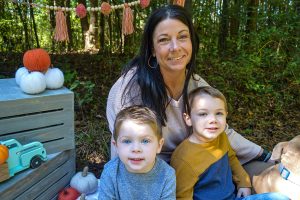
Disher heard about the HGP from juvenile court and has been part of the program since November 2020. She said the assistance with daycare, new book bags for school and the level of care and concern the program has shown, which has included monthly health check-ups, has been a lifesaver.
“I deeply appreciate the level of friendship I have developed with Mr. Patton and my nurse, Carina Boyd,” Disher said. “This program has brought peace of mind and hope to all of us. We have been treated like family in the most important ways.”
Providing the necessary support
Patton said most of the grandparents he works with feel underappreciated for a variety of reasons, especially those who have been raising their grandchildren without legal custody. He said a lot of them are doing the work but have a difficult time getting their grandchildren’s birth certificates, enrolling them in school, obtaining immunization records and accessing health care or mental health services for them.
“They feel underappreciated by the children’s parents and frequently by the grandchildren, although those feelings from the grandchildren change over time,” Patton said. “But it’s important to point out that a lot of grandparents are raising grandchildren who had loving and caring parents, but passed away from natural causes, complications during childbirth, car accidents and even murder.
“Regardless of how they became grandparent caregivers, they do have feelings of being taken for granted and that the sacrifices they make go unnoticed, even by other family members.”
He mentioned that most of the grandparents struggle to get the necessary information to ensure proper care for their grandchildren. The program has been able to fill in a lot of these informational or accessibility gaps.
“Grandparents simply need access to information in regard to their legal rights and responsibilities, managing their grandchild’s emotional rollercoaster, where to go for help such as tutoring and counseling,” Patton said. “Once we are able to educate and fill in informational gaps, the grandparents are extremely proactive and diligent about getting their grandchildren the help and support they need. But one of the most important resources the grandparents have access to through the program is that support they receive from one another through the monthly support group meetings.
“When they are able to meet and connect with other families in similar situations, it’s like a lifeline and a bond that never goes away,” Patton said. “They have the opportunity to share their stories, struggles, heartbreak — as well as the joy they get from providing their grandchildren with a better life.”
Davis said the number of grandparents raising grandchildren across the country continues to increase. Currently, 2.7 million children in the U.S. are being raised by relatives without a parent in the home.
However, Davis noted that grandparent families are being used as a welfare placement without the necessary financial support from Child and Family Services.
“The number of traditional foster homes for abused and neglected children has seen a steady decline, while the number of children in kinship care has steadily risen,” Davis said. “Children placed in kinship care has grown 18% more than the number of children placed in traditional foster homes over the past decade.”
According to data reported by Generations United, for every one child in the formal foster care system, there are 19 children being raised by their grandparents and other relatives outside of the formal foster care system.
“Grandparent-headed households are one of the fastest-growing family forms in the country, particularly for states in the south and southwest,” Davis said.
To acknowledge this trend, Georgia Gov. Nathan Deal signed bill HB543 into law in June 2018. With the help of Rep. Brian Prince of House District 127, this bill recognized grandparents who are raising their grandchildren as de facto parents, and made it much easier for them to go into court and be recognized as their grandchildren’s legal guardian.
Finding the financial means
Patton said for the past 23 years, the HGP at Augusta University has received state funding from the Department of Human Resources Promoting Safe and Stable Families Program. It is a competitive renewal grant that they have to apply for each year.
“It is a 75-25 matching grant where the College of Nursing has to match the grant funding with 25% funding of their own,” Patton said. “Since 2009, we have received a grant from the CSRA Regional Commission, which we primarily use to provide grandparents with some respite care during the summer months by enrolling grandchildren into a number of different summer camp programs here in Augusta, which is also a competitive renewal grant we have to apply for every year and requires 10% matching funds from the College of Nursing.”
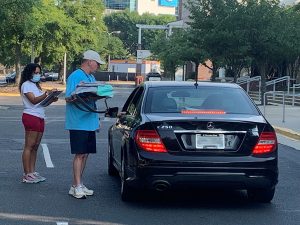
Patton said they also look at local grant opportunities, primarily to supplement the number of grandchildren they can send to summer camp, provide with back-to-school supplies, and send to after-school enrichment activities like arts lessons and sports programs.
“The Columbia County Merchant’s Association, Richmond County Exchange Club, and Women in Philanthropy have been a tremendous help for us to be able to expand the number of families we are able to provide services for,” he said.
Patton was quick to point out the program has received thousands of dollars in donations locally from individuals, businesses and groups. Since 2009, they have received over $92,000 in financial donations locally, which excludes the material aid they receive such as donated book bags, school supplies and holiday gifts.
“Each year we receive between 300 and 400 gifts for the grandchildren … many from employees here at Augusta University,” Patton said. “We have been very fortunate to receive a great deal of support over the years, and we are very thankful for the community’s generosity. The support we receive from the community is critical to us because while our grant funding typically stays the same from year to year, the number of families we serve increases each year.”
Gratitude for the program
Davis is thankful to be involved with the Healthy Grandparents Program, and notes it only reinforces her opinion that the CSRA needs more nurses to work within the community to build strength-based services.
“The HGP services are tailored to the needs of the grandparents and grandchildren. The grandparents and grandchildren are amazingly resilient. I learn from them every day as they share their stories. I have a better appreciation and understanding for the challenges they face but moreso, their ability to thrive.”
Patton is also thankful for the program, to which he has devoted most of his professional life. One of his first experiences working with children was in college when he was taking a mentoring class at Valdosta State University. Students were paired with a local elementary student who was struggling with reading and would go to their school once a week and tutor them for an hour.
“I fell in love with it and started making home visits to tutor him on the weekends,” Patton said. “Ironically, he and his brother were being raised by their grandmother … I knew right then and there I wanted to be a social worker. I just didn’t know that I would end up working in a program specifically for grandparents raising their grandchildren.”
When he came to Augusta University, he spent the first few weeks researching, trying to learn as much as he could about the needs and struggles of grandparent caregivers.
“Grandparents have been raising their grandchildren for decades … They certainly don’t need to be educated on how to raise their grandchildren,” Patton said.
“But without question, there are a lot of obstacles for grandparent caregivers. There are many sources of stress for these families and our job is to facilitate their access to information, resources, and to do what I call ‘shut up and listen.’ We try to make things a little easier for the families, but there is no question the greatest advocate the grandchildren have is their grandparents.”
Disher, grandmother of Oakley and Hudson, said “Mike is an amazing person, and the level of care, guidance and resources to help with any needs is indescribable. This program is definitely successful due to the standards he presents.”
For the Lewis family, Patton and Davis have meant everything.
“Some people don’t have the finances to get a lawyer to help them out to get their grandchildren in a safe and proper environment, and with Mike and Ms. Mary and the rest of the staff, they are helping however they can,” Natasha Lewis said. “He’ll go to court with the families to speak on their behalf and he knows the history of every child that he goes to court for. He has been a life-saver to us grandparents.”
Woodring said she’s been fortunate to remain involved in the program, saying the HGP is one of the highlights of her career.
“Mike has kept me informed about the adoptions which have occurred, the achievements of our grandparents, the students who have graduated from high school and now those graduating from college,” she said. “Each is a success for the individual, the program and the community. I couldn’t be more proud.
“We began the HGP with high ideals but very little financial support … much of the work and the costs were borne by volunteers,” Woodring added.
“Mike has been the consistent ‘heart’ of the project from day one. Faculty resources have come and gone, and I am grateful that Dr. Mary Lou Davis continues, but it has been Mike’s unrelenting dedication to the cause that has resulted in this level of success. Mike has become recognized nationally as a knowledgeable advisor, a fair disciplinarian of the children and an unsurpassed advocate of grandparents who raise their grandchildren.”
 Augusta University
Augusta University
